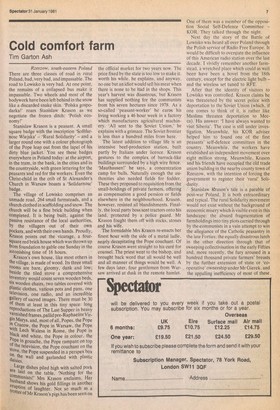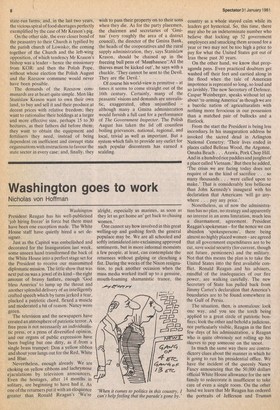Cold comfort farm
Tim Garton Ash
Rzeszow, south-eastern Poland There are three classes of road in rural Poland, bad, very bad, and impassable. The road to Lowisko is very bad. At one point, the remains of a collapsed bus make it impassable. Two wheels and most of the bodywork have been left behind in the snow like a discarded snake skin. `Polska gospodarka!' roars Stanislaw Krason as we negotiate the frozen ditch: `Polish economy!'
Stanislaw Krason is a peasant. A small square badge with the inscription `So[Marnose Wiejska' `Rural Solidarity' — and a larger round one with a colour photograph of the Pope leap out from the lapel of his dirty blue jacket. You see these badges everywhere in Poland today; at the airport, in the tram, in the bank, in the cities and in the countryside, with green lettering for the peasants 'and red for the workers. Even the Christ-child in the crib of St Alexander's Church in Warsaw boasts a `Solidarnosc' badge.
The village of Lowisko comprises an unmade road, 264 small farmsteads, and a church clothed in scaffolding and'snow. The church will be a fine brick building when Completed. It is being built, against the Passive resistance of the local authorities, by the villagers out of their own Pockets, and with their own hands. Proudly, Krason points out the vicarage, a foursquare red brick house which was thrown up from foundation to gable one Sunday in the astonishing time of 16 hours. Krason's own house, like most others in the village, is made of wood. Its three small rooms are bare, gloomy, dank and low; beside the tiled stove a comprehensive inventory would count seven wooden beds, SIX wooden chairs, two tables covered with Plastic clothes, various pots and pans, one television, one radio, and an incredible gallery of sacred images. There must be 30 of them at least in this tiny space: long reproductions of The Last Supper in heavy varnished frarnes,pallid pie-Raphaelite Vir0° Marys, and, most of all, Popes, the Pope in Cracow, the Pope in Warsaw, the Pope With Lech Walesa in Rome, the Pope in _black and white, the Pope in colour, the PoPe in gouache, the Pope rampant on top of the television, the Pope couchant on the sotove, the Pope suspended in a perspex box n the wall and garlanded with plastic daisies.
Large dishes piled high with salted pork are laid on the table. `Nothing for the e, ortimunists!' Mrs Krason exclaims. Her einisband shows his gold fillings in another trruPti" of laughter, Not so much as a otter of Mr Krason's pigs has been seen on the official market for two years now. The price fixed by the state is too low to make it. worth his while, he explains, and anyway, no one but an idiot would sell his meat when there is none to be liad in the shops. This year's harvest was disastrous, but Krason has supplied nothing for the communists from his seven hectares since 1978. As a so-called 'peasant-worker' he earns his living working a 46 hour week in a factory which manufactures agricultural machinery. 'All sent to the Soviet Union,' he explainsWith a grimace. The Soviet frontier is less than a hundred miles from here.
The latest addition to village life is an intensive beef-production station, built partly by Italians under licence. Krason gestures to the complex of barrack-like buildings surrounded by a high wire fence. 'Mauthausen!' he says, a concentration camp for bulls. Naturally enough the authorities also needed fields for fodder. These they proposed to requisition from the small-holdings of private farmers, offering as compensation a good pension or fields elsewhere in the neighbourhood. Krason, however, resisted all blandishments. Finally, the local party boss sent tractors onto his land, protected by a police guard. Mr Krason fought them off with sticks, stones and his wife.
The formidable Mrs Krason re-enacts her finest hour with the side of a metal ladle. nearly decapitating the Pope couchant. Of course Krason -went straight to his cure for counsel, The priest went to the bishop, and brought back word that all would he well and all manner of things would be well. A few days later, four gentlemen from Warsaw arrived at dusk in the remote hamlet. One of them was a member of the opposition Social Self-Defence Committee — KOR. They talked through the night.
Next day the story of the Battle of Lowisko was heard all over Poland through the Polish service of Radio Free Europe. It would be difficult to overstate the influence of this American radio station over the last decade. I vividly remember another farmstead, a wretched place which could as well been have been a. hovel from the 18th century, except for the electric light bulb — and the wireless set tuned to RFE.
After that the identity of visitors to Lowisko was controlled. Krason claims he was threatened by the secret police with deportation to the Soviet Union (which, if one comes to think of it, is rather like Muslims threaten deportation to Mecca). His answer: 'I have always wanted to visit Siberia'. The case is still under investigation. Meanwhile, his KOR adviser helped him to found one of the first peasants' self-defence committees in the country. Meanwhile, the workers have established an independent movement over eight million strong. Meanwhile. Krason and his friends have occupied the old trade union building in the nearby county town of Rzeszow, with the intention of forcing the government to register their 'rural' Solidarity.
Stanislaw Krason's tale is a parable of post-war Poland. It is both extraordinary and typical. The rural Solidarity movement would not exist without the background of economic misery which visible even in this landscape: the absurd fragmentation of farmholdings into tiny plots carried through by the,communists in a vain attempt to win the allegiance of the Catholic peasantry in the late Forties; the equally disastrous lurch in the other direction through that of sweeping collectivisation in the early Fifties and, more recently, the fury aroused in a hundred thousand private farmers' breasts by the further extension of state or 'cooperative' ownership under Mr Gierek, and the appalling inefficiency of most of these.
state-run farms; and, in the last two years, the vicious spiral of food shortages perfectly exemplified by the case of Mr Krason's pig.
On the other side, the ever closer bond of the peasantry to their Church is typified by the parish church of Lowisko; the coming together of the Church and the left-wing opposition, of which tendency Mr Krason's bishop was a leader — hence the missionary from KOR: and then the Polish Pope, without whose election the Polish August and the Rzeszow commune would never have been possible.
The demands of the Rzeszow communards are at heart quite simple. Men like Stanislaw Krason want to own their own land, to buy and sell it and their produce at decent prices with relative freedom; they want to rationalise their holdings at a larger and more effective size, perhaps 15 to 30 hectares, as their fathers did before them; they want to obtain the equipment and fertilisers they need, instead of being dependent on inefficient and corrupt state organisations with instructions to favour the state sector in every case; and, finally, they wish to pass their property on to their sons when they die. As for the party placemen, the chairmen and secretaries of `Gminas' (very roughly the area of a district council), the director of the Gmina Bank, the heads of the cooperatives and the rural supply administration, they, says Stanislaw Krason, should be chained up in the freezing bull pens of `Matuthausen',,All the thieves must be kicked out', he says with a chuckle. `They cannot be sent to the Devil. They are the Devil.'
Of course his world-view is primitive — at times it seems to come straight out of the 16th century. Certainly, many of the peasants' visions and demands are unrealistic, exaggerated, often unjustified — although many a Gmina administration would furnish a full cast for a performance of The Government Inspector. The Polish August has taken the lid off countless , boiling grievances, national, regional, and local, trivial as well as important. But a system which fails to provide any outlet for such popular discontents has earned a scalding.







































 Previous page
Previous page